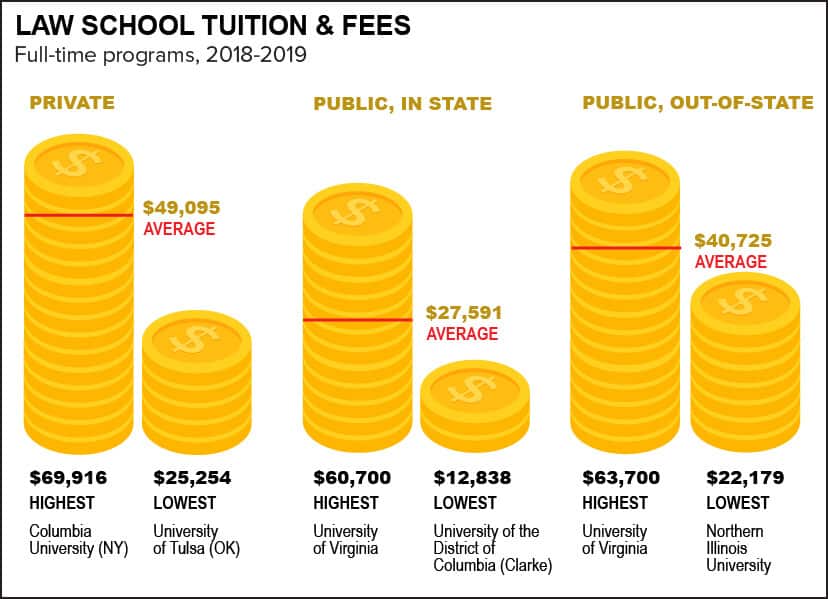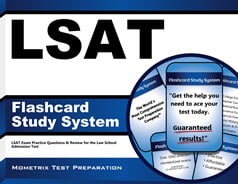What did you want to be when you grew up?
Many kids wanted to be doctors or even veterinarians.
Others wanted to become lawyers.
There are different reasons why people choose to become lawyers. It can be anything from a large salary, social status, or just having the desire to help others in a variety of ways.
Whatever your reason is for wanting to become a lawyer, it takes several years and a lot of hard work.
Getting into law school can feel overwhelming; there are a lot of processes that go with it, such as deciding which law school to apply to, taking the LSAT and more.
So, if you’re ready to go to law school, but need a little help, here are a few tips to help you get into the law school you want.
Things to Consider When Deciding if Law School is Right for You
Does reading hundreds of pages a week intimidate you?
You’ll be required to do a lot of reading in law school. As a law student, you’ll be required to read an average of 3 to 4 hours each day. If you want to take a day off, you’ll need to plan to add reading to your day.
Even after you graduate law school, the reading doesn’t end. Many lawyers will spend at least 10 hours per week reading. If you’re a younger lawyer, you may spend up to 30 hours per week reading.
Are you organized and detail-oriented?
Being completely organized while you’re in law school is vital for your success. You’ll need to keep up with what classes you’re taking and when, assignments, and any other appointments you might have regarding law school.
You’re also going to be taking a lot of notes in your classes, so you’ll want to make sure to write down specific details regarding legal jargon and case studies. You’re going to be required to think on your toes and handle multiple storylines and their facts. So is it not only important that you are organized and detail-oriented, but you also need to have razor-sharp focus.
Do you have law firm experience?
Interning or working for a law firm is probably the best way to know if going to law school is right for you. Having hands-on law training can help you understand more about how being a lawyer and working in a law firm is. You’ll be able to advise clients under supervision, draft and present motions, investigate cases, and communicate with opposing counsel.
However, the training you receive may depend on the individual law firm. If the firm focuses more on criminal cases, you’ll learn more about criminal law; if the firm focuses on family cases, you’ll learn about family law. While interning or working in a law firm prior to law school may not give you an advantage for getting into law school, it will still give you great hands-on experience.
Understand how much law school actually costs.
When you’re considering going to law school, there are a lot of costs that you’ll need to consider. You’ll need to consider the cost of books, tuition, transportation, and many other things when you’re in law school.
Tuition
According to USNews.com the average annual tuition and fees for the 2018-2019 academic year for private law schools was $49,095. This average is about $8,400 higher than the average annual tuition for out-of-state law schools. The average annual tuition and fees for in-state and public law schools was around $21,500.

Housing
You’ll need to decide where you’ll live during your time in law school. The costs of housing vary from school to school. Some campuses offer on-campus housing while other campuses require you to live off-campus. Also, depending on the area of where you will be living, houses in larger cities are usually more expensive. You’ll need to decide where you will be living and if you will need a roommate or two to help cover the expenses of housing.
Books
Things like books may seem trivial compared to the amount you’ll be paying for law school, but books can cost anywhere from $1,000 to $2,250 each year.
Health Insurance
Most schools, if not all, require students to carry health insurance. The amount will vary depending on school and which insurance company the school uses.
Other Expenses
There are other expenses that you may need to consider when wanting to go to law school, however, it depends on the law school you want to attend.
Activity/Recreation Center Fee – Some schools require you to pay a fee if you choose to use their activity and recreation center. One law school charges $500 for 9 months of use.
You will also have to consider the costs for meals, transportation, any loan fees, personal expenses, and more.
Still feel like law school is right for you?
After you’ve read what it takes to be in law school and how much it will cost, and you still want to go to law school, here are a few more things about how to get into law school.
Applying to Law School
Understand the Law School Admissions Process
Get an Undergraduate Degree
Before you apply to law school, you’ll need to have an undergraduate degree. All law schools require their students to hold at least a bachelor’s degree. You do not have to have a specific major or field of study when you’re working on your bachelor’s degree; the ABA doesn’t require or recommend any one area of study. Many students choose to major in political science, business, economics, or philosophy.
Consider Your GPA
Whether you realize it or not, your GPA in your undergraduate studies weighs more than you think when it comes to applying for law school. While your GPA is not the most important, it looks good for you to have a high GPA. Your GPA is almost as important as your LSAT score. For some law schools, your GPA matters just as much as your LSAT scores.
What is an Average LSAT Score? | What are Good LSAT Scores?
Take and Pass the LSAT

After earning your bachelor’s degree, you’ll need to take and pass the Law School Admission Test (LSAT) before you can apply to law school. This exam is very important to the admissions decision. The LSAT measures your skills in reading comprehension, analysis and critical thinking, information management, reasoning, and argumentation. The admissions department uses your scores from the LSAT to measure and assess your knowledge and to determine if you will be successful in law school. Your LSAT score is the most important number that law schools will use to evaluate your application for admissions.
Letters of Recommendation
Letters of recommendations help your chances of getting into law school. They’re required for almost every law school application and are important to the application process. While your GPA and LSAT scores are the major factor in determining if the law school will accept you, a big determining factor will be your letters of recommendation.
Letters of recommendation are written by professors and supervisors that you have established a strong relationship with during your time in college. Letters of recommendations need to be written by those who know you well and can explain your ability to succeed in law school. Your letters of recommendation should explain your character traits and your academic achievements.
Personal Statement
Depending on the law school you’re applying to, you may be asked to write a personal statement. Your personal statement is almost as important as your GPA and LSAT score. A personal statement is basically a short essay where you explain who you are and why you want to go to law school. Writing a personal statement will give the admissions officer a choice to understand your motivation for wanting to go to law school and the reasons why you want to attend their school.
Start Submitting Law School Applications
Many applications will be available in the fall. As soon as they become available, start submitting your application. Plan to make sure that you submit your applications by November but no later than December 1. You’ll have a better shot at getting a spot in law school if you apply early.

When you’re choosing which law school to apply to, make sure that you familiarize yourself with that school’s requirements such as their requirement for LSAT scores and GPAs. You’ll also want to consider the cost of that school as well as what scholarships you may be getting.
It’s also a good idea to determine early on which area of law you want to specialize in such as criminal law or family law. You’ll want to find a school that is known for its strength in that area.
Remember that getting into law school is going to take a lot of time and effort. If you’re serious about getting into law school, make sure that you start preparing early such as getting a good GPA in your undergraduate studies and preparing for the LSAT.
If you have other questions about law school, you can visit the official LSAC website.
What You Can Expect in Law School
The experience you have in law school can depend on which school you attend. However, most law schools have the same approach to first-year law students. The first year in law school is usually the most difficult for many students.
Law school can be competitive and pretty intense when it comes to the curriculum. You’ll be expected to read 50 to 75 pages of case law every day. In some classes, your professors may use the Socratic Method which is calling on a random student to ask them questions about what they should have read. You never know when you’ll be called on; it’s one way for your professor to see that you’re doing your daily reading assignments.
Many law schools don’t allow students to pick and choose their classes during their first year but rather have them take foundational classes that they’ll need to know in their second and third year of law school.
The first-year curriculum is the foundation of your law school education. No matter which school you decide to attend, you’ll have the same courses during your first year. Here are the foundational courses you will take:
Civil Procedure
Civil Procedure is the law governing how civil cases are litigated and the litigation process. This class teaches you the rules of who can sue whom, as well as how, when and where they can do it. It covers items such as jurisdiction and standing to sue, motions and pleadings, pretrial procedure, the structure of a lawsuit, as well as judgments and appeals. You’ll need to memorize the Uniform Commercial Code as well as the Federal Rules of Civil Procedures.
Constitutional Law
This is the study of the Constitution and the powers it gives to the government. You’ll study the legislative powers of the federal and state governments, questions of civil liberties and constitutional history which includes the Bill of Rights and constitutional freedom. You’ll also learn more about the structure of the United States government and individual rights.
Contracts
This is a two-semester long course. It covers the law about making deals with an offer, acceptance of the offer, and consideration. This class also covers breach of contracts, ways to get out of a contract and what kinds of remedies are available.
Criminal Law and Criminal Procedure
This course covers the bases of criminal responsibility and examines the rules and policies for enforcing sanctions against those who are accused of committing offenses. You will also learn what makes something a criminal offense and how crimes are punished.
Legal Method
This course will be your introduction to the American legal system and its processes. It will be your first exposure to actually practicing law. You will learn how to research the law as well as argue it.
Legal Writing
This course will teach you the fundamentals of legal writing and how to research the law as well as how to write a legal memo dealing with various legal problems.
Property Law
This class will cover anything dealing with property. You’ll learn about the purchase, possession, and sale of the property. You will also study the legal relationship between people and land, buildings, natural resources, and personal objects.
Torts
In this course, you’ll study the law of negligence and how people perform harmful acts that are punishable under civil law. You will study the repercussions of trespassing, assault/battery, false imprisonment, and more.
On top of attending classes during your first year, you’ll also be required to participate in a moot court exercise which will require you to argue a hypothetical court case.
Also in your first year, you should start thinking about what classes you prefer to take in your second year that will pertain to the specialization you wish to go into.

